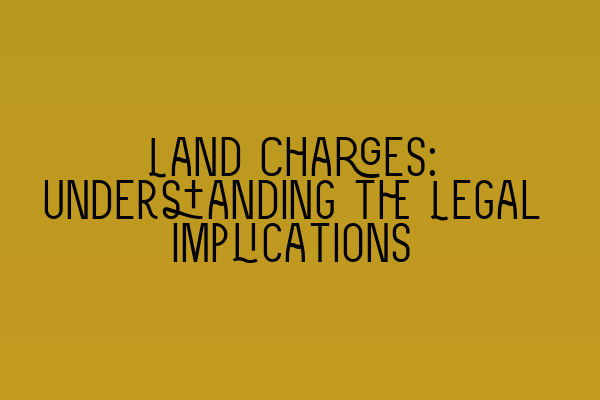Land Charges: Understanding the Legal Implications
As a solicitor specializing in property law and land law, I frequently come across clients who have questions and concerns regarding land charges. This vital aspect of property ownership and transactions can often be complex, which is why understanding the legal implications is crucial.
In this blog post, I will explain what land charges are, why they matter, and how they can impact property ownership. I will also provide some insight into how you can navigate land charges effectively to protect your interests. So, let’s dive in!
What are Land Charges?
Land charges refer to any encumbrances or restrictions that are registered against a property. These charges serve as a legal notification and are typically registered with the Land Charges Department of the Land Registry. They ensure that any prospective buyers or mortgage lenders are aware of any existing interests or rights that may affect the property.
Why do Land Charges Matter?
Land charges are essential because they provide transparency and protect the interests of both buyers and lenders. By registering these charges, parties involved in property transactions can make informed decisions and mitigate potential risks.
If a property has undisclosed charges, a buyer may unknowingly acquire the property subject to those charges. This can lead to legal disputes and financial implications down the line. Similarly, a lender may be hesitant to provide a mortgage if there are existing charges that could jeopardize their security.
Types of Land Charges:
There are various types of land charges that can be registered against a property. Some of the most common ones include:
1. Restrictive Covenants: These are conditions or limitations placed on the use of the property, often imposed by a previous owner or a developer. Restrictive covenants may restrict the type of building that can be constructed or prevent certain activities from taking place on the property.
2. Equitable Charges: Equitable charges are interests or rights that give someone a financial claim over the property. These charges do not appear on the property title but can still affect its ownership.
3. Easements: Easements grant someone the right to use or access another person’s property for a specific purpose. It could include rights of way, right to light, or the right to lay pipes or cables underground.
4. Judgments and Orders: Certain court judgments or orders, such as a charging order, can be registered as land charges. These charges provide security for creditors, allowing them to recover their debts from the proceeds of the property’s sale.
Navigating Land Charges:
When buying or selling a property, it’s essential to conduct thorough due diligence to identify any existing land charges. Working with an experienced solicitor who specializes in property law can help ensure all charges are identified and properly addressed.
Performing a comprehensive search at the Land Charges Department is crucial, as it will reveal the registered charges on the property. This search should be carried out before completing any property transactions to avoid any surprises or disputes later on.
Understanding the legal implications of land charges is vital for all parties involved in property transactions. By being aware of these charges and seeking professional advice, you can make informed decisions and protect your interests.
To further prepare for exams related to property law and land law, consider using the following resources:
– SQE 1 Practice Exam Questions: This resource provides practice questions to test your knowledge and understanding of property law concepts.
– SQE 1 Practice Mocks FLK1 FLK2: Practice mocks can help simulate exam conditions and improve your performance in property law assessments.
– SQE 2 Preparation Courses: These courses are designed to help you prepare for the SQE 2 exams, which include components covering property law.
– SQE 1 Preparation Courses: Enhance your understanding of property law and other relevant subjects through dedicated preparation courses for the SQE 1 exams.
– SRA SQE Exam Dates: Stay updated on the latest exam dates for the Solicitors Regulation Authority’s SQE exams to plan your study schedule effectively.
In conclusion, land charges play a critical role in property transactions, ensuring transparency and protecting the interests of all parties involved. It is essential to understand the different types of land charges and conduct thorough due diligence when buying or selling a property. Seek professional advice from a specialized solicitor to navigate land charges effectively and safeguard your interests.
